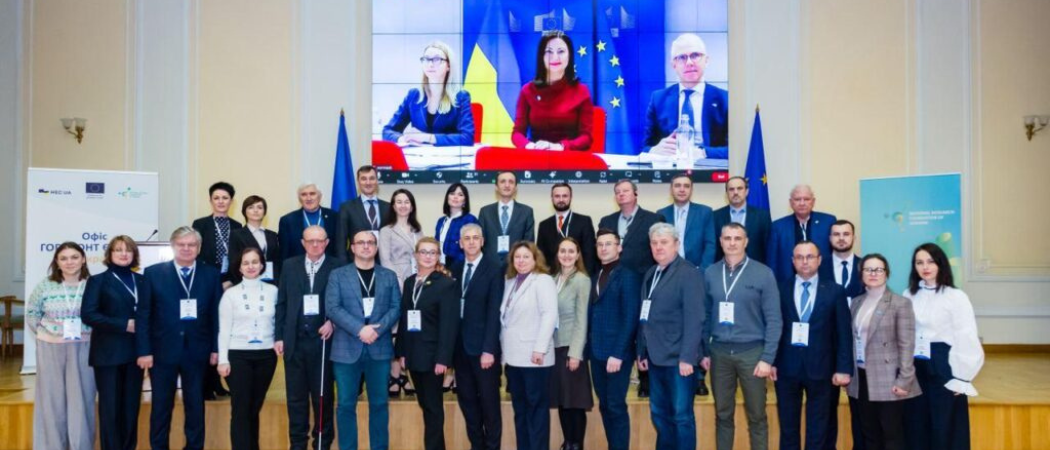The EU could ban Ukraine from quantum, space, AI and ICT calls in 2026 and 2027

The launch of EU’s Horizon Office in Kyiv, 20 December 2023.
The European Commission could ban Ukraine from participating in Horizon Europe projects that are related to AI, quantum, communication and network technologies, and space, according to an internal memo circulated in the first week of November and later seen by Science|Business.
The memo was meant to inform staff in the Commission’s research and innovation department about progress on the assessment of security risks in countries associated to Horizon Europe. It says that the Ukrainian government did not provide “sufficient assurances” that it can safeguard critical technologies from espionage and leakages and has failed to demonstrate its capacity to safeguard the EU’s “assets, autonomy or security.”
The Commission’s assessment is based on government answers to a questionnaire sent by the Commission in July. A Commission spokesperson said the questionnaire was sent to all 20 associated and “candidate-associated” countries to determine whether they are eligible to participate in 14 of the most sensitive topics planned for the final two years of Horizon Europe, 2026 and 2027.
At the moment, Ukrainian researchers and organisations are involved in several Horizon projects focused on topics that could fall under a potential ban. This includes several projects in Earth observation and post-quantum cryptography, according to Commission data.
The leaked memo says that Ukraine provided “insufficient assurances for all sensitive topics” in AI, quantum, communication and network technologies, and space. Meanwhile, Canada, New Zealand, Switzerland and the United Kingdom provided “sufficient assurances” to participate in the restricted topics. As for Israel and South Korea, governments provided “sufficient assurances” to be eligible for calls in all topics except space.
The negative assessment of Ukraine’s ability to safeguard the interests of the EU while participating in sensitive projects comes at a time when policymakers in Brussels and Kyiv are working on strengthening ties in research and innovation.
The European Parliament and EU Council recently agreed to allow Ukraine to join the European Defence Fund, a €7.3 billion programme supporting cross-border defence research and development projects, which would enable Ukrainian innovators to participate fully in EU consortia.
As for Horizon Europe, Ukraine has been an associated country since 2022, when the Commission agreed that Ukrainian researchers and innovators “can fully participate” in the Framework Programme “on equal terms” with partners in EU member states.
The questionnaire
This is the first time since 2022 that Ukraine has participated in the eligibility assessment foreseen by Article 22(5) in the Horizon Europe legislation. The article stipulates that the Commission can restrict access to funding calls related to the “strategic assets, interests, autonomy or security” of the EU, and it is not unusual for the Commission to restrict access to sensitive topics. Until this year, the UK and Switzerland were also banned from participating in calls on quantum and space technologies.
According to the Commission, the Ukrainian government submitted its response at the beginning of September, two months after the questionnaire was sent.
The questionnaire, seen by Science|Business, probed the Ukrainian government’s ability to protect intellectual property rights and whether it can offer guarantees against “risks to the Union’s strategic assets, interests, autonomy or security.” Another part of the questionnaire inquired about Ukraine’s ability to control foreign direct investments in sensitive sectors.
Related articles
- Ukraine mulls plan for rebuilding its science sector
- UK and Switzerland to gain access to ‘strategic’ Horizon Europe calls
A source familiar with how the questionnaire made its way through the Ukrainian ministry and then back to the Commission has confirmed the negative result of the assessment and noted that the main point of contention could be related to slow progress on a national law on foreign direct investments. “The legislation we have is still not in line with the EU’s, but [the government] is working on a draft law,” the source said.
In addition, the education and science ministry in Kyiv could have worked faster and more diligently on the responses to the questionnaire. Additional help would have been needed from other parts of the Ukrainian government, including the ministries for defence and digital affairs, but those institutions do not disclose information on how the government funds sensitive technologies, “at least not to [a Commission] questionnaire,” the source said.
Narrow window of opportunity
It's unclear whether the Ukrainian government is now trying to convince the Commission it can still participate in these sensitive projects. But time is running out, as EU member states are very close to reaching an agreement on the Horizon work programmes, detailed documents laying out the topics, budgets and eligibility criteria for the next two years.
“Should any additional information or clarification have been necessary to complete the assessment, the European Commission requested it accordingly,” a Commission spokesperson told Science|Business.
The final results of the assessment “will be shared with the respective associated countries via the sending of an official letter, prior to the official publication of the work programme,” the spokesperson said.
Ukraine’s research ministry did not respond to a request for comment.





 A unique international forum for public research organisations and companies to connect their external engagement with strategic interests around their R&D system.
A unique international forum for public research organisations and companies to connect their external engagement with strategic interests around their R&D system.